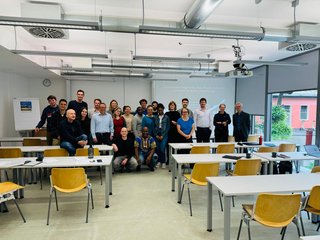Organizers: Javier Revilla Diez, Lisa-Michéle Niesters, Debora Gerstenberger (on behalf of the Graduate School of Geosciences and the Global South Study Center)
The masterclass aimed to better understand the construction, decay, deconstruction, and reconstruction of infrastructures in the Global South, exploring their implications for spatial and temporal orders. It challenges the presumption that infrastructure is inherently positive, acknowledging that challenges extend beyond adverse circumstances or resource shortages. The maintenance or alteration of infrastructures is intricately linked to the struggle for the "right" temporal order of society.
The Masterclass was a very successful events. Ten master and PhD students attended and engaged very actively in the discussions on different forma of infrastructures, their temporalities, how infrastructures and imaginaries and narratives around them mutual shape one another, how they impact societies as well as questions of stakeholder involved and social inclusion and exclusion.
The event had been organized in two parts, the first session on Thursday was developed for the students only, with presentation from Peter Dannenberg (University of Cologne) and Miguel Esteban (Waseda University, Tokio). The second session was a joint event together with a PIs workshop of the Global South Study Center (GSSC) with a keynote from Miguel Esteban (Waseda University, Tokio) and following presentations from Franziska Sielker (Technical University of Vienna, Austria) and Sumit Vij (Wageningen University, the Netherlands). Due to the interdisciplinary background of the invited speakers and attendees, a huge variety of different perspectives on infrastructures were shown to the students and discussed with them.
Topic and aim of the Masterclass: Infrastructures, vital for societal functioning, operate at various levels, fostering connectivity. Traditionally propelling economic and transportation development, they facilitate communication and trade across distances. Recent prominence in globalization, exemplified by projects like the Chinese Road and Belt Initiative and digital infrastructures, is linked to future development. However, challenges such as migration and environmental change offer new perspectives. While infrastructures shield against natural hazards, promote resilient cities, and conserve nature, they can also be used to control, segregate, and impede population flows.
Infrastructures influence societies not only through physical structures but also through experiences, perceptions, and imaginings associated with them, shaping risk communication, daily habits, place identity, and narrative formation. They can either unite or divide, raising questions about participation, power dynamics, and social inclusion or exclusion.
Beyond territorial impact, infrastructures possess temporal dimensions, embodying specific forms not solely oriented towards the future.
